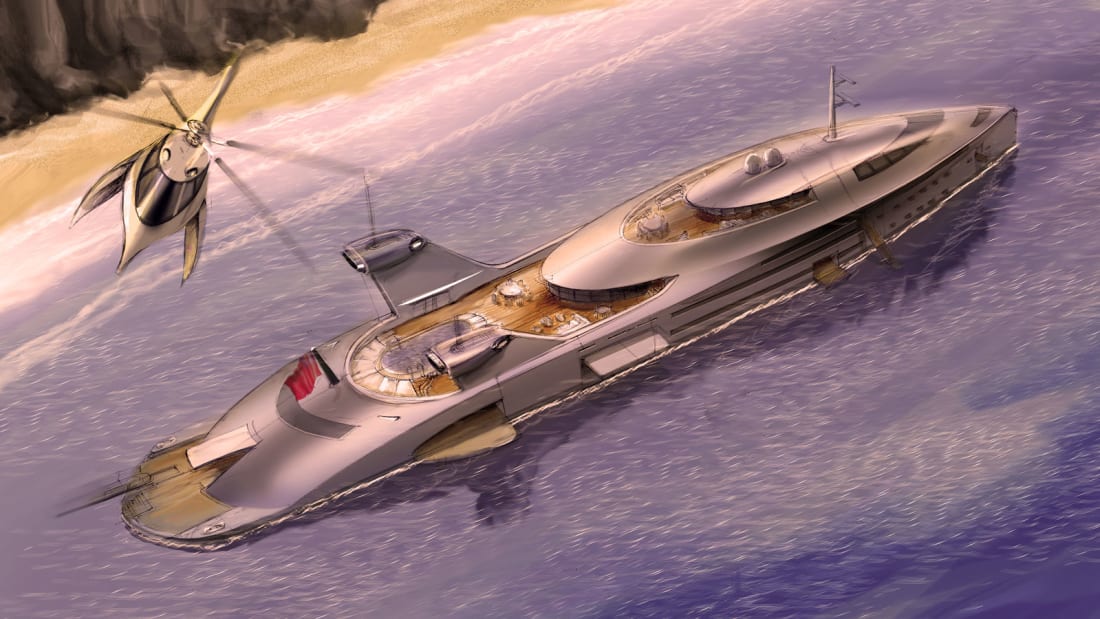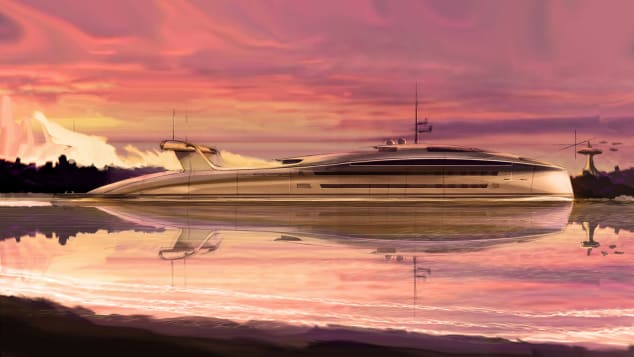(CNN) — Rather than dropping in popularity, superyachts have been more in demand than ever during global pandemic.
However, yacht designer Uros Pavasovic has come up with a rather unorthodox way of utilizing discarded aircraft while simultaneously pushing the boundaries of superyacht design.
He's devised a 130-meter vessel that's powered by re-purposed jet engines located on its upper shell.
Unveiled earlier this month, the Cobra concept, is influenced by military aircraft and looks like something from a futuristic movie.
"News of all those discarded airplanes and their perfectly functioning jet engines made me wonder how they could be re-purposed in a 'Mad Max'-inspired, post-pandemic world," explains Pavasovic.
Science-fiction style
A rendering for the Cobra concept, a new superyacht design that's powered by re-purposed jet engines.
Uros Pavasovic Studio
"Cobra is a 130-meter hybrid yacht with exposed jet engines that are used to efficiently power the generators.
Pavasovic says he took inspiration from streamlined fighter jet canopy while designing the vessel.
Its structure was conceptualized with the Lockheed SR-7 "Blackbird," which was operated by both the United States Air Force and NASA before being retired in 1999, in mind.
The Cobra concept also has an onboard helicopter that has the ability to land on water, ruling out any need for an onboard helipad.
The inspiration for its five-seater tender boat, a mini version of the main yacht, was provided by ground-effect vehicles (GEV), particularly Cold War-era flying sea craft Ekranoplan, which was powered by jet engines and actually glided a few yards above the water.
In addition, the vessel will also hold a main deck with a swimming pool, a large swimming platform and a super-sized beach club.
While Pavasovic describes the Cobra concept as an "out of the box concept bordering on science fiction," he insists that it's very much "buildable."
"It might look like science fiction, but it's not total fantasy," he adds. "The only unreal element is that those engines would be loud!"
The noise from the exposed jet engines could easily be canceled out if they were contained in a sound insulated engine room in the hull, says Pavasovic.
"With this engine location swap ,the general aesthetic and performance would still be preserved and the vertical wings would now hold satellite, communication, and navigation equipment instead," he says.
'Out of the box concept'
Yacht designer Uros Pavasovic says he came up with the idea after seeing the huge numbers of aircraft retired during the pandemic.
Uros Pavasovic Studio
But Pavasovic considers the Cobra concept as a one-off project rather than an indication of the future of superyacht design.
It's one of two new concepts he's just released (the second being the 40-meter EX40,) to celebrate the first anniversary of his London-based firm Pavasovic Studio.
If the Cobra concept were to be picked up, Pavasovic believes it would take approximately four years to design, engineer and build.
The price tag would "likely be hundreds of millions of dollars" depending on where it was built and the final specifications.
"So far, the response has been overwhelming, especially on the creative side of the concept," he says, before stressing that the concept is aimed at a specific type of owner.
"This design would only appeal to a handful of owners out there who are less concerned with chartering, and place style and speed above maximizing the space usage."
While using unwanted jet engines to power a superyacht may be a new and interesting notion, this certainly isn't the first modern concept that's taken inspiration from aircraft.
Last year, Italian shipyard Codecasa unveiled plans for a 230-foot superyacht concept Codecasa Jet 2020, which "borrows" many of the stylistic features of a jumbo jet.
Meanwhile, Italian design studio Officina Armare has announced plans for a 360-foot superyacht concept that takes inspiration from both naval ships and spacecraft. 





![[Gallery] The One And Only WD40 Trick Everyone Should Know [Gallery] The One And Only WD40 Trick Everyone Should Know](https://images.outbrainimg.com/transform/v3/eyJpdSI6ImRhOWQ2MDc2NmE0OTViOGNkMzU5ODExZjVmZWU3Yzc5MTRlNzZhMDFhZjdmYzJhYWY5NTMyNTcwNGJiMmQyZjQiLCJ3IjozODEsImgiOjI1NCwiZCI6Mi4wLCJjcyI6MCwiZiI6NH0.webp)
Comments
Post a Comment